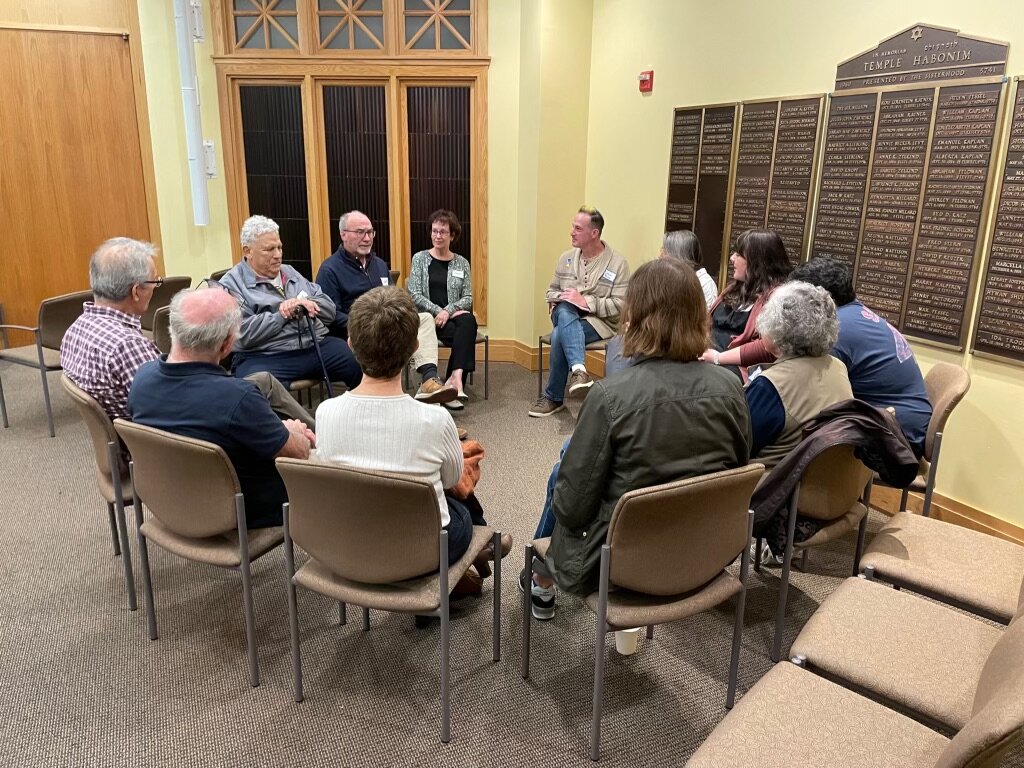Learning and sharing about Israel and the Middle East at Temple Habonim
BARRINGTON, RI – Nearly 100 people filled the sanctuary at Temple Habonim in Barrington on the evening of Oct. 26, for a presentation by Dr. Heidi Lane, a professor at the U.S. Naval War College and director of its Greater Middle East Studies Group.
Rabbi Howard Voss-Altman welcomed the crowd, expressing that while “our hearts are broken, we are not broken in spirit.” The event was open to all and drew a multigenerational crowd, including academics and activists; secular and religious people of different faiths; conservatives and liberals; people born outside the United States; government and community leaders; retired members of the press; and people from many other walks of life. The common thread tying participants together was an interest in creating a community of understanding.
Rabbi Voss-Altman introduced Lane, who in addition to her professional credentials, is a member of Temple Habonim.
Lane provided attendees with a summary of events leading to the establishment of the modern State of Israel. “The basic parameters, to remind everyone, is that it was under UN auspices that the partition was made,” said Lane, as she described the 1947 UN Partition Plan. “And there were about 11 countries that were part of the UN Commission on Palestine,” she continued, adding that the nations involved had been selected because they were not involved in WWII and did not have a direct interest.
She explained the series of conflicts from then until now, and the current geopolitical status of Israel, the West Bank and Gaza. The presentation included an overview of Palestinian resistance movements, an assessment of challenges for civilians, information about the demographics of the region and a summary of peace negotiations over the years.
Chris Larned, of Barrington, said the presentation “was excellent, as [it] clarified the many diverse parties involved.”
Following the presentation, attendees split into small groups and participated in conversations facilitated by Temple Habonim staff and volunteers. The facilitators offered everyone an opportunity to introduce themselves and share their reasons for attending. “Many attending the discussion currently have family living in Israel or have recently visited,” shared Larned, whose youngest son is living in northern Lebanon working for a humanitarian organization. “We appreciated sharing with others our hope he can avoid harm’s way. It was helpful for us to hear the concerns of others with family members in the region and realize how connected we all truly are.”
The groups discussed commonalities and differences of Israelis and Palestinians, and shared hopes and worries for the region. Concerns about rising antisemitism and Islamophobia were expressed by many.
“It’s hard to see the global response to the tragic attack on Oct. 7 and not feel vulnerable,” said Jamie Jankowski, a Temple Habonim member who often travels internationally for work. “It felt good to connect with others,” she continued. “Community feels more important than ever, today.”
JACOB BRIER, a member of Temple Habonim, is an organizational engagement and HR consultant, living in Barrington. They are a former member of the Barrington Town Council and current volunteer with the Barrington Public School’s Diversity, Equity and Inclusivity Committee.








